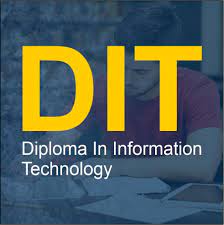
DIT course in Islamabad
The Diploma in Information Technology (DIT) is a comprehensive program designed to equip students with essential knowledge and skills in the field of information technology. This program is tailored to provide a strong foundation in various aspects of IT, enabling students to excel in a wide range of IT-related roles. From fundamental concepts to practical applications, the DIT course covers a diverse array of topics that are crucial in today’s technology-driven world.
Course Benefits:
The Diploma in Information Technology offers numerous benefits to students seeking to enter the IT industry or enhance their existing IT skills. Some key advantages of this course include:
- Practical Skill Development: The program focuses on hands-on learning, allowing students to gain practical experience in various IT domains.
- Industry-Relevant Curriculum: The curriculum is designed in collaboration with industry experts, ensuring that graduates possess skills and knowledge aligned with current IT trends and demands.
- Versatile Career Opportunities: Upon completion, students can pursue careers in roles such as IT support specialists, software developers, network administrators, and more.
- Pathway to Further Education: The diploma serves as a stepping stone for higher education in IT-related fields, including bachelor’s degree programs.
- Networking Opportunities: Students have the chance to connect with fellow learners and professionals, fostering a supportive learning community.
- Flexible Learning: The course offers flexible study options, including online and part-time study modes, catering to a diverse range of learners.
Course Learning Outcomes:
Upon completing the Diploma in Information Technology, students will be able to:
- Demonstrate a comprehensive understanding of foundational IT concepts, principles, and technologies.
- Apply problem-solving skills to analyze and resolve IT-related challenges.
- Develop and implement software solutions using programming languages and tools.
- Configure and manage computer networks, ensuring efficient data transmission and security.
- Utilize database systems to store, retrieve, and manipulate data effectively.
- Apply knowledge of cybersecurity principles to safeguard digital assets and systems.
- Communicate effectively with technical and non-technical stakeholders in the IT industry.
- Work collaboratively in team-based IT projects, demonstrating effective teamwork and project management skills.
Course Study Units:
The Diploma in Information Technology comprises a series of study units that cover a wide spectrum of IT topics. Some of the key study units include:
- Introduction to Information Technology:
- Fundamental concepts of IT
- History and evolution of computing
- Programming Fundamentals:
- Introduction to programming languages
- Algorithmic thinking and problem-solving
- Database Management Systems:
- Database design and normalization
- SQL queries and data manipulation
- Computer Networks:
- Network architecture and protocols
- Network configuration and troubleshooting
- Web Development:
- HTML, CSS, and JavaScript
- Building interactive web applications
- Software Development:
- Object-oriented programming principles
- Software development life cycle
- Cybersecurity Essentials:
- Threats and vulnerabilities in the digital landscape
- Security measures and best practices
- IT Project Management:
- Project planning and execution
- Risk assessment and mitigation
Entry Requirements:
To enroll in the Diploma in Information Technology program, applicants are required to meet the following entry requirements:
- High school diploma or equivalent qualification.
- Proficiency in basic mathematics and English.
- Basic computer literacy and familiarity with operating systems.
- Strong interest in information technology and its applications.
Future Progressions:
Upon successful completion of the Diploma in Information Technology, graduates have several avenues for further progression:
- Bachelor’s Degree: Graduates can pursue a bachelor’s degree in IT-related fields, such as Computer Science, Software Engineering, or Network Administration.
- Certifications: Obtaining industry-recognized certifications in areas like programming languages, network administration, or cybersecurity can enhance career prospects.
- Specialization: Graduates can choose to specialize in specific IT domains, such as mobile app development, data science, cloud computing, etc.
- Entry-Level IT Positions: Graduates can apply for entry-level positions in IT support, junior programming, or system administration roles.
- Entrepreneurship: Armed with IT skills, graduates can explore entrepreneurial opportunities by developing software applications, websites, or IT consulting services.
Conclusion:
The Diploma in Information Technology offers a comprehensive curriculum that equips students with the knowledge and skills required to excel in the dynamic field of IT. From programming to cybersecurity, graduates are well-prepared to tackle the challenges of the digital age and make meaningful contributions to the ever-evolving IT industry. This program not only opens doors to diverse career paths but also provides a solid foundation for further education and specialization in the exciting world of technology.